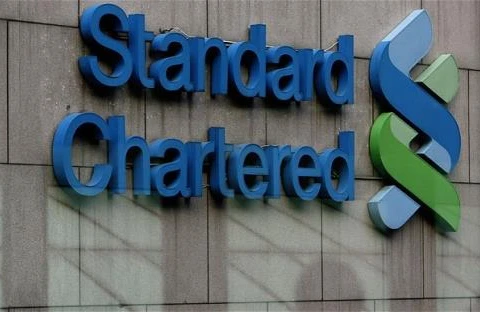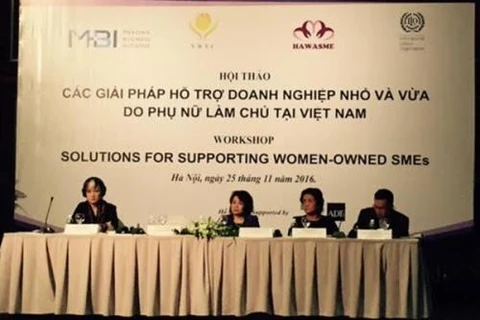Hanoi (VNA) - Policies related to credit guarantees need to be revised to improve the credit access of enterprises, especially small- and medium-sized enterprises (SMEs) and micro firms, Deputy Prime Minister Vuong Dinh Hue said on December 13.
He emphasised the important role of credit guarantee mechanisms given that the State budget is limited and the business community has not received significantly efficient support.
In 2011, the then-Prime Minister issued a decision on credit guarantee mechanisms for SMEs to access loans from commercial banks. In 2013, another decision on establishment of credit guarantee funds in provinces and cities was promulgated.
Deputy Minister of Finance Tran Van Hieu said that the legal framework is expected to create favourable conditions for SMEs to access capital from credit institutions in order to maintain operation and expand production.
Currently, there are 27 credit guarantee funds nationwide but most of the funds have weak financial capacity because the capital comes mainly from local State budgets, Hieu said.
Credit guarantee funds have three sources: local State budgets, contributions from enterprises, and finances from domestic and foreign organisations. The overseas source is almost insignificant while contributions from enterprises are not regular as they have to struggle themselves.
The total charter capital of the 27 funds is approximately 1.4 trillion VND (65 million USD) while the amount of guaranteed loans reaches 361 billion VND.
Nguyen Chi Trang, Deputy General Director of the Vietnam Development Bank (VDB) which is also assigned by the Government as a guarantor for SMEs, said the bank’s guarantee activities are hindered by the inconsistencies in the project appraisal procedures by VDB and commercial banks, not to mention the shortage of money.
Due to the inconsistencies, it takes SMEs up to three months to get loans, Deputy Governor of the State Bank of Vietnam Nguyen Dong Tien said.
The Vietnam Association of Small and Medium-sized Enterprises Chairman Cao Sy Kiem told the Vietnam News Agency that the majority of enterprises hesitated to use credit underwriting to borrow bank loans.
He attributed the hesitation to complicated procedures in accessing the guarantee service. When firms deal with both guarantee funds and commercial banks, they face the same assessment process but have to pay fees twice, he added.
The lack of close co-operation and mutual confidence between guarantors and commercial banks is also an obstacle for SMEs to receive supports, Kiem said.
Given the situation, Deputy PM Hue asked relevant ministries and agencies to work out clear criteria to define which enterprises really need supports.
He assigned the Ministry of Finance to revise the credit guarantee mechanism, study the possibility of providing guarantee service without requiring collaterals, and set reasonable guarantee fee levels. - VNA
He emphasised the important role of credit guarantee mechanisms given that the State budget is limited and the business community has not received significantly efficient support.
In 2011, the then-Prime Minister issued a decision on credit guarantee mechanisms for SMEs to access loans from commercial banks. In 2013, another decision on establishment of credit guarantee funds in provinces and cities was promulgated.
Deputy Minister of Finance Tran Van Hieu said that the legal framework is expected to create favourable conditions for SMEs to access capital from credit institutions in order to maintain operation and expand production.
Currently, there are 27 credit guarantee funds nationwide but most of the funds have weak financial capacity because the capital comes mainly from local State budgets, Hieu said.
Credit guarantee funds have three sources: local State budgets, contributions from enterprises, and finances from domestic and foreign organisations. The overseas source is almost insignificant while contributions from enterprises are not regular as they have to struggle themselves.
The total charter capital of the 27 funds is approximately 1.4 trillion VND (65 million USD) while the amount of guaranteed loans reaches 361 billion VND.
Nguyen Chi Trang, Deputy General Director of the Vietnam Development Bank (VDB) which is also assigned by the Government as a guarantor for SMEs, said the bank’s guarantee activities are hindered by the inconsistencies in the project appraisal procedures by VDB and commercial banks, not to mention the shortage of money.
Due to the inconsistencies, it takes SMEs up to three months to get loans, Deputy Governor of the State Bank of Vietnam Nguyen Dong Tien said.
The Vietnam Association of Small and Medium-sized Enterprises Chairman Cao Sy Kiem told the Vietnam News Agency that the majority of enterprises hesitated to use credit underwriting to borrow bank loans.
He attributed the hesitation to complicated procedures in accessing the guarantee service. When firms deal with both guarantee funds and commercial banks, they face the same assessment process but have to pay fees twice, he added.
The lack of close co-operation and mutual confidence between guarantors and commercial banks is also an obstacle for SMEs to receive supports, Kiem said.
Given the situation, Deputy PM Hue asked relevant ministries and agencies to work out clear criteria to define which enterprises really need supports.
He assigned the Ministry of Finance to revise the credit guarantee mechanism, study the possibility of providing guarantee service without requiring collaterals, and set reasonable guarantee fee levels. - VNA
VNA
























